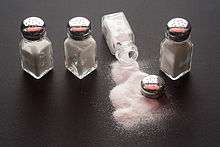Definify.com
Webster 1913 Edition
Sal
Sal
Sal
Webster 1828 Edition
Sal
SAL
,Definition 2026
Sal
sal
sal
English
Noun
sal (uncountable)
Usage notes
Was used predominantly to form the names of various chemical compounds.
Derived terms
|
|
|
Etymology 2
Alternative forms
Noun
sal (plural sals)
- Shorea robusta, a dipterocarpaceous tree.
- 1989, Thomas Weber, Hugging the trees: the story of the Chipko movement (page 18)
- As the sals were cut in the lower foothill districts the loggers looked towards the mountains in their search for other hardwood timber.
- 1989, Thomas Weber, Hugging the trees: the story of the Chipko movement (page 18)
Translations
Anagrams
Chairel
Noun
sal
References
- W. McCulloch, Account of the Valley of Munnipore and of the Hill tribes with a comparative vocabulary of the Munnipore and other languages (1859, Calcutta: Bengal Printing Company)
Danish
Etymology
From Old Norse salr, from Proto-Germanic *saliz, from Proto-Indo-European *sol-, *sel-.
Noun
sal c (singular definite salen, plural indefinite sale)
Declension
Derived terms
Latin
Etymology
From Proto-Indo-European *seh₂l-.
Cognates include Sanskrit सलिल (salila), Old Armenian աղ (ał), Ancient Greek ἅλς (háls), Tocharian A sāle, and Old English sealt (English salt).
Pronunciation
- (Classical) IPA(key): /saːl/, [saːɫ]
Noun
sāl m, n (genitive salis); third declension Can be masculine or neuter, but the plural is masculine (sales).
Inflection
This table shows how sāl is inflected when it is masculine. If neuter, the accusative is sāl.
Third declension.
| Case | Singular | Plural |
|---|---|---|
| nominative | sāl | salēs |
| genitive | salis | salum |
| dative | salī | salibus |
| accusative | salem | salēs |
| ablative | sale | salibus |
| vocative | sāl | salēs |
Derived terms
Descendants
Norwegian Bokmål
Etymology 1
Noun
sal m (definite singular salen, indefinite plural saler, definite plural salene)
Derived terms
Etymology 2
From Old Norse sǫðull.
Alternative forms
Noun
sal m (definite singular salen, indefinite plural saler, definite plural salene)
- a saddle
References
- “sal” in The Bokmål Dictionary.
Norwegian Nynorsk
Etymology 1
Noun
sal m (definite singular salen, indefinite plural salar, definite plural salane)
Derived terms
Etymology 2
From Old Norse sǫðull.
Noun
sal m (definite singular salen, indefinite plural salar, definite plural salane)
- a saddle
Etymology 3
From Old Norse sal (“payment”).
Noun
sal n (definite singular salet, indefinite plural sal, definite plural sala)
Related terms
References
- “sal” in The Nynorsk Dictionary.
Old English
Etymology
From Proto-Germanic *sailą (“rope”). Cognate with Old Saxon sēl (Dutch zeel), Old High German seil (German Seil).
Noun
sāl m
Declension
This noun needs an inflection-table template.
Descendants
- English: sole
Old Spanish
Etymology
From Latin salem, accusative of sāl.
Pronunciation
- IPA(key): [ˈsal]
Noun
sal f (plural sales)
- salt
- c. 1250: Alfonso X, Lapidario, f. 61r.
- Et ſu ṕpriedat es de aborrecer la ſal tanto que bié parece que a entramas grand enemiztat. ca ſi las ponen en uno. quiebra la piedra ¬ mueles; ¬ la ſal pierde la ſalgadumbre que a en ella.
- And its property is that it loathes salt so much that it would seem that there is a great enmity between them both, for if they are placed together, the stone breaks, and the salt loses all the saltiness within.
- Et ſu ṕpriedat es de aborrecer la ſal tanto que bié parece que a entramas grand enemiztat. ca ſi las ponen en uno. quiebra la piedra ¬ mueles; ¬ la ſal pierde la ſalgadumbre que a en ella.
- c. 1250: Alfonso X, Lapidario, f. 61r.
Related terms
- salado
- salgadumbre
- salgadura
Descendants
- Spanish: sal
Portuguese

Pronunciation
Etymology 1
From Old Portuguese sal, from Latin salem (“salt, wit”), from Proto-Indo-European *seh₂l- (“salt”).
Noun
sal m (plural sais)
- salt (sodium chloride, a substance used as a condiment and preservative)
- (chemistry) salt (any compound formed from the reaction of an acid with a base)
- (chiefly in the plural) bath salt (any of several inorganic salts sometimes added to bath water)
- (figuratively) wit; the quality of being engaging
Synonyms
- (sodium chloride): cloreto de sódio, sal de cozinha
- (bath salt): sal de banho
- (wit): graça
Derived terms
- salzinho (diminutive)
|
|
Related terms
Etymology 2
Noun
sal m (plural sais)
- (rare) sal (Shorea robusta, a dipterocarpaceous tree)
Romanian
Pronunciation
- IPA(key): [sal]
Etymology 1
From Turkish şal, from Persian شال (šāl).
Noun
sal n (plural saluri)
Synonyms
Etymology 2
Shortened form of salut.
Interjection
sal!
Synonyms
Romansch
Alternative forms
- (Puter) sel
Etymology
From Latin sāl, salem, from Proto-Indo-European *séh₂ls.
Noun
sal m
Spanish
Pronunciation
- IPA(key): /sal/
- Rhymes: -al
Etymology 1
From Old Spanish sal, from Latin sāl (compare Catalan sal, French sel, Italian sale, Portuguese sal, Romanian sare), from Proto-Indo-European *seh₂l-, a root shared by English salt.
Noun
sal f (plural sales)
Synonyms
- (table salt): sal común f, sal de mesa f
Derived terms
|
|
|
Related terms
Etymology 2
Verb
sal
Swedish
Etymology
From Old Norse salr, from Proto-Germanic *saliz, from Proto-Indo-European *sol-, *sel-.
Pronunciation
Noun
sal c
- a large room (for dining or meetings)
Declension
| Inflection of sal | ||||
|---|---|---|---|---|
| Singular | Plural | |||
| Indefinite | Definite | Indefinite | Definite | |
| Nominative | sal | salen | salar | salarna |
| Genitive | sals | salens | salars | salarnas |
Related terms
- hörsal
- matsal
Turkish
Noun
sal (definite accusative salı, plural sallar)
Verb
sal (third-person singular simple present salar)
- set free!